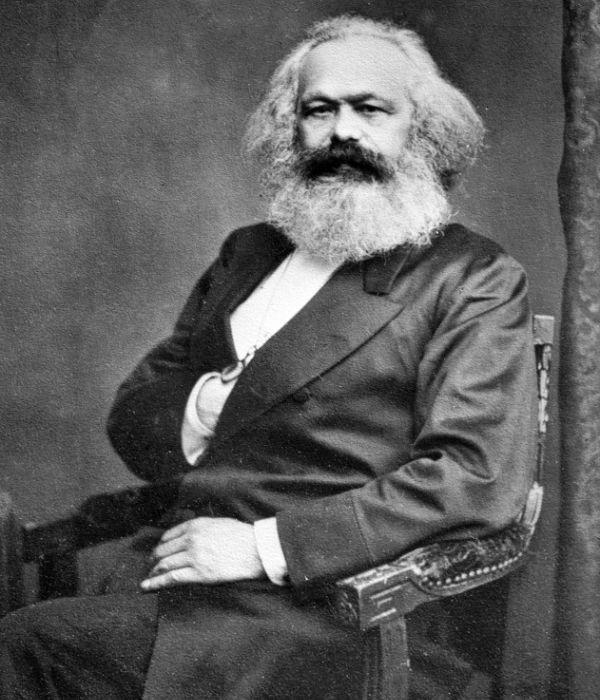Early Life
Marx's father, a lawyer, converted from Judaism to Lutheranism in 1824. Marx studied law at Bonn and Berlin, but became interested in philosophy and took a Ph.D. degree at Jena (1841). He early rejected the idealism of Georg Wilhelm Friedrich Hegel and turned toward materialism, partly through the influence of Ludwig Feuerbach and Moses Hess.
Early Work
In 1842 he became editor of the Rheinische Zeitung, but his demands for radical reforms led to its suppression in 1843. He then went to Paris, where he began his lifelong association with Friedrich Engels. At this time Marx became a socialist. He devoured the works of Adam Smith, David Ricardo, the comte de Saint-Simon, and many others. Antagonized by the individualistic radicalism of Pierre Joseph Proudhon, Marx attacked him in The Poverty of Philosophy (1847, tr. 1910), an early attempt to systematize his own thought. In this period also he wrote, with Engels, The German Ideology (tr. 1933), which provided an exposition of his dialectical materialism. Breaking with the tradition of justifying social reform by appeal to natural rights, he invoked “inevitable” laws of history to predict the eventual triumph of the working class.
Later Work and Life
In 1847 Marx joined the Communist League and with Engels wrote for it the famous Communist Manifesto (1848), which strikingly expressed his general view of the class struggle. The failure of the revolutions of 1848 convinced Marx of the need to stimulate the consciousness and solidarity of the working class through the founding of open revolutionary parties. Exiled from most continental centers, he settled permanently in London in 1849. He lived in poverty, made more bitter by his own chronic illness and the death of several of his children. At times he was able to earn funds as a correspondent for the New York Tribune, but he was continually dependent on Engels for financial aid. Nonetheless, he pursued research in the British Museum and continued to write steadily.
In 1864 Marx helped to found the International Workingmen's Association. Through this First International and through the work of Ferdinand Lassalle and others, Marx's ideas began to gain primacy in European socialist and radical thought. This primacy was greatly furthered with the publication of the first volume of Das Kapital (Vol. I, 1867, tr. 1886; Vol. II–III, ed. by Engels, 1885–94; tr. 1907–9). The manuscript for the fourth volume was edited by Karl Kautsky and published as Theorien über den Mehrwert (3 parts, 1905–10; tr. of 1st part, A History of Economic Theories, 1952). A monumental work, Das Kapital provided a thorough exposition of Marxism and became the foundation of international socialism.
As Marx's reputation spread, so too did public fear of him. He insisted on authoritarian sway within the International, and finally, after controversy with Mikhail Bakunin, virtually destroyed the International for fear of losing control over its direction. He remained the prophet of socialism and was often consulted by the various socialist party leaders. His role was frequently that of urging more hard-minded policies, further removed from bourgeois embellishments; The Gotha Program (1891, tr. 1922), a critique, illustrates this position. The complexity and vituperation of this polemic characterize much of Marx's prose. In his last years Marx's great intellectual vigor continued unabated. The importance of his dialectical method and of his theories goes far beyond their immense political influence; many scholars consider him a great economic theoretician and the founder of economic history and sociology.
Bibliography:
There are many translations and editions of Marx's best-known works and of his and Engels's selected correspondence. See the Collected Works of Marx and Engels (40 vol., 1975–83). The standard biography of Marx is that by Franz Mehring (tr. 1935); other notable works include those by Otto Rühle (tr. 1929), E. H. Carr (1938), C. J. S. Sprigge (1938), Karl Korsch (1939), and Isaiah Berlin (4d ed. 1978). Recent biographies are by Robert Payne (1968), David McLellan (1973), Peter Singer (1980), and Allen Wood (1985).
Who2. Copyright © 1998-2006 by Who2?, LLC. All rights reserved.
Also Born on May 05
- Soren Kierkegaardphilosopher and religious thinker (1813)
- Nellie Blyjournalist (1867)
- Tyrone Poweractor (1914)
- Arthur L Schawlowphysicist (1921)
- Tammy Wynettecountry singer (1942)
- Adelesinger (1988)
Who Shares Your Birthday?
The Day You Were Born
The Year You Were Born












